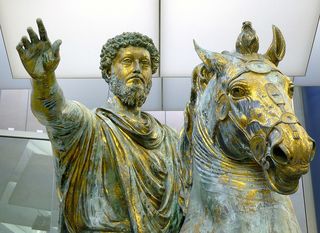Rejection Sensitivity
The Stoic Rejection of Fame
Marcus Aurelius and the worthlessness of fame.
Posted December 27, 2019 Reviewed by Lybi Ma

“How many who once rose to fame are now consigned to oblivion: and how many who sang their fame are long disappeared.”
I’ve been reading through Meditations, by Marcus Aurelius, and have found there to be some very useful insights for us today. One common theme is the worthlessness of fame and the irrationality of making it one of our primary goals in life.
How many people today seek fame, thinking it will bring them true and lasting happiness? Too many. A better question to ask, in the spirit of the Stoics, is, how many people who have actually become famous tell us that it brought them such happiness?
Marcus Aurelius offers many reasons for thinking that the pursuit of fame is not reasonable. The quote above offers one such reason. Not only are many who were once famous now unknown, but so are those who gave them their fame. What use is it now, to either the famous or those who made them so? In short, no use, because they are all dead.
Consider this: “On fame. Look at their minds, the nature of their thought and what they seek or avoid. And see how, just as drifting sands constantly overlay the previous sand, so in our lives what we once did is very quickly covered over by subsequent layers.”
We’ve all heard the truism about someone’s fifteen minutes of fame. Aurelius has something like this in mind. Our deeds which once gave us fame are lost quickly, as the attention of others is drawn elsewhere. This was apparently true in his day, and in ours, it's also the case. In fact, these days, the window of fame can be much shorter, covered over much more quickly, by the endless and uninterrupted stream of news, information, and social media drama.
He concludes that “the only lasting fame is oblivion.” What should we do, then, instead of worry about fame, in whatever big or small pond in which we swim?
This seems like a good place to start, from Aurelius: “Whatever anyone does or says, I must be a good man.” Be a good person, a good human being. Let’s start there, and as we do so, not only might we become better people, we also might help create better communities and a better world.


